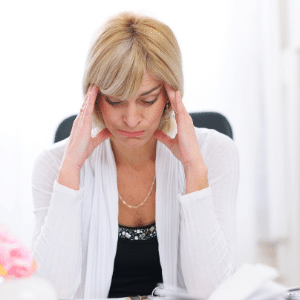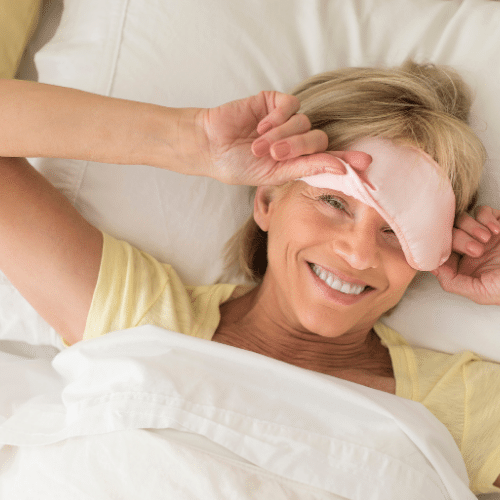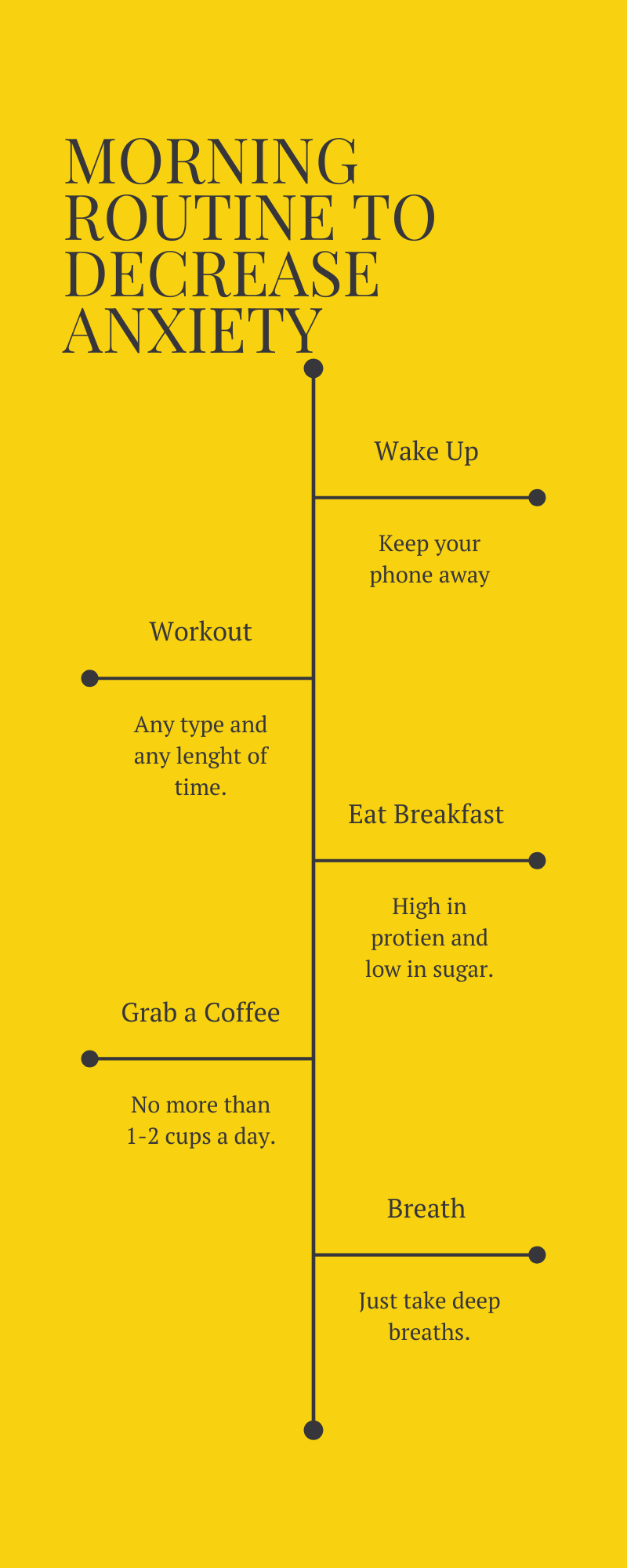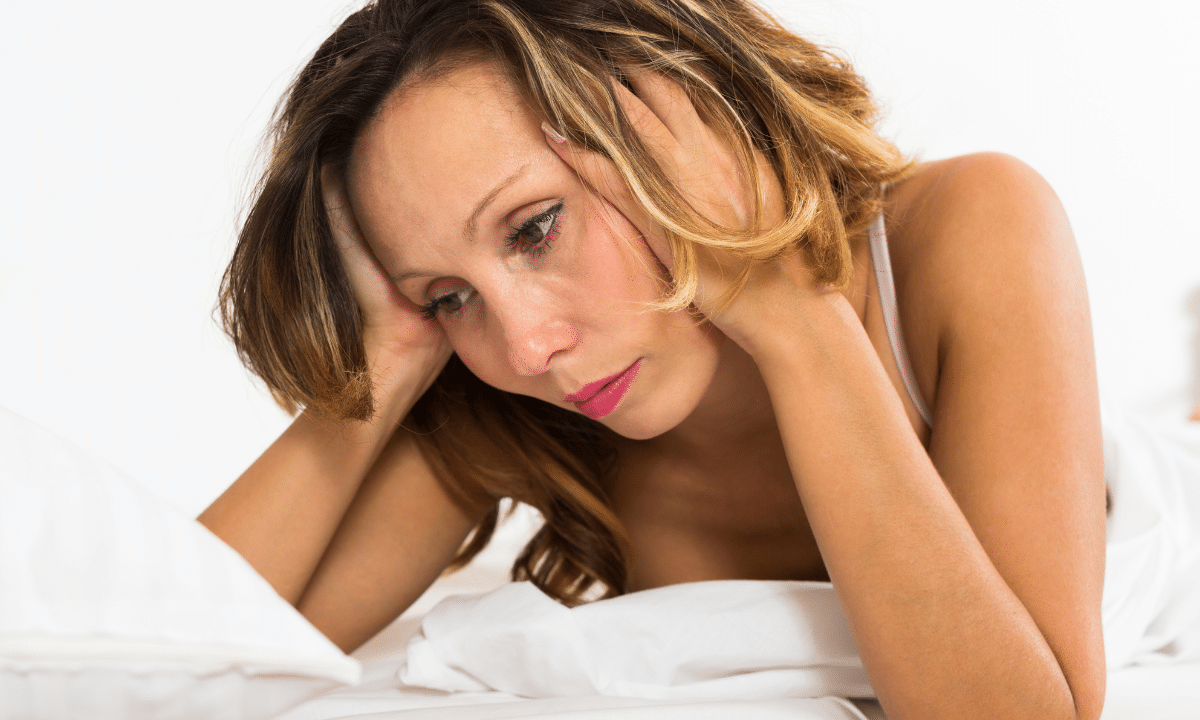Tips to Reduce Perimenopause Anxiety in the Morning
Perimenopause anxiety in the morning is more common than you think!
Table of Contents
ToggleEven some women who never experienced anxiety before notice this unpleasant (and debilitating) feeling, and women who had it before, can feel it even stronger!
However, because morning anxiety is common, it does not mean you have to live with it. There are many things that you can do to help.
What Are the Causes of Morning Perimenopause Anxiety?

You can also blame hormone imbalances for anxiety during perimenopause.
A big part of morning anxiety is that your stress hormone cortisol levels are higher in the morning to help you wake up. Before perimenopause, estrogen helps to control the spike. However, as your estrogen levels go down, there is more cortisol to overwhelm your nervous system in the morning.
Moreover, higher cortisol levels can also show up during the night, causing sleep disorders and further contributing to morning anxiety.
Last, everyday stressors in life (such as taking care of older parents while taking care of your children) can further aggravate overall anxiety.
Hot Flushes and Anxiety
Research shows us that anxiety can be the cause of hot flushes and hot flushes can be the cause of anxiety (1)
Like many things in perimenopause, it is the chicken and the egg situation.
On the one hand, hot flushes can cause anxiety. Plus, hot flushes at night can interfere with a good night’s sleep, contributing to morning anxiety.
On the other hand, stress and anxiety can cause or worsen hot flushes. Moreover, when anxiety is severe, perimenopausal women can feel suddenly hot and sweaty and believe it is a hot flush. So, what a woman might perceive as a hot flush, might be severe anxiety or a panic attack.
Other anxiety symptoms include heart palpitations, feeling nervous, tense, or restless, having an increased heart rate, having trouble concentrating, or simply feeling weak or tired.
Now that we established that nervousness, fearful feelings, and irritability in the mornings are common, let’s talk about solutions for morning anxiety.
What Are Natural Ways to Treat Perimenopause Anxiety in the Morning?
- Better sleep
- Establishing morning routines to cope with morning anxiety
- Eating foods that can help decrease anxiety
- Regular exercise
- Balancing your hormones
- Therapy
Make Sleep a Priority
You can also blame hormone imbalances for anxiety during perimenopause.
A big part of morning anxiety is that your stress hormone cortisol levels are higher in the morning to help you wake up. Before perimenopause, estrogen helps to control the spike. However, as your estrogen levels go down, there is more cortisol to overwhelm your nervous system in the morning.

To decrease morning anxiety, the first thing to work on is getting a good night’s sleep. While this can be difficult during menopause, any improvement in the quality and quantity of sleep will help you feel better in the morning and throughout the day.
The sleep foundation recommends the following lifestyle changes to help you sleep better:
- Maintain a regular bed and wake up time schedule
- Budget time to sleep
- Create a regular, relaxing nighttime routine
- Create a sleep environment that is dark, quiet, comfortable, and cool
- Use your bedroom only for relaxation and sex
- Be physically active most days of the week
- Limit alcohol, especially at night
- Limit caffeine to 1-2 cups a day early in the morning
Balancing Cortisol Levels Throughout the Night
If you wake up in the middle of the night feeling fully awake or anxious, this can mean that you have a spike in cortisol levels. Discuss with your doctor potential solutions for the spike of cortisol at night. However, it is good to know that there are over-the-counter (as well as prescribed) supplements that can specifically help you manage cortisol levels during the night.
Nighttime Hot Flushes
Hot flushes are a common reason for waking up in the middle of the night (2). You can decrease night sweats by sleeping in a cold environment and wearing light clothes. (3) Also, it is a good idea to limit alcohol and caffeine if you experience this annoying symptom.
Morning Routines to Decrease Perimenopause Anxiety
While you might not control the immediate feeling of anxiety, you can control what you do in the morning. Establishing a routine to help you ease into the day can help to decrease the sensation.
First, let’s talk about what not to do. There are two things to avoid in the morning; one is looking at your phone the first thing in the morning, and the other is allowing negative thoughts that increase your anxiety. So start the day by doing something for yourself!
Now, let’s talk about what to do:
Workout
A morning workout does not have to be strenuous or even away from home. The goal here is to release anxiety and have good endorphins running throughout your body. Even a 10 minutes yoga routine will help.
Of course, if you are the person that wakes up in the morning and likes to do a full workout routine, go for it! Exercising early in the morning is one of the best ways to start the day.
A warning for you: it is important not to sacrifice sleep for a full workout. You need to aim for 7 to 9 hours of sleep every night. Plan ahead, go to sleep early, to fit both into your routine. Sacrificing sleep for exercising can make anxiety worse and might even be bad for your waistline.
Wake Up a Little Early
Allow yourself to take the morning at ease instead of rushing to get to work or get your family out the door. Instead, give yourself time to work out, have a cup of herbal tea, or meditate.
Prepare the Night Before
Minimize the number of tasks you have to do in the morning. For example, have your clothes ready and easy breakfast items available. Having fewer things to do can prevent the morning rush and help you decrease your anxiety.
Meditate
Mediation is one of the best relaxation techniques to help you decrease anxiety at any time of the day. Starting your day with a short (or long) meditation can help you feel more relaxed. Several apps can make it easier to find a mediation method that works well for you.
Try Deep Breathing Techniques
Regular practice of deep breathing may have notable effects on your sense of relaxation. For example, a wise board-certified doctor practicing functional medicine told me that the best medicine is to take two deep breaths to decrease your anxiety symptoms.
Establishing positive morning routines can help you decrease the feelings of anxiety, boost productivity throughout the day, and improve your overall mental health.

Eat Breakfast Foods Designed to Decrease Perimenopause Anxiety

Nutrition can help anxiety in many ways. First, eating a diet rich in whole grains, vegetables and fruits can provide essential nutrients to combat anxiety.
Also, eating protein-rich foods can help you make key neurotransmitters that will help you feel more relaxed. There is also the likelihood that when you eat a protein-rich breakfast, you will skip high-sugar foods that can make anxiety worse.
Moreover, there is a connection between gut health and anxiety. A healthy gut can help you feel more relaxed and sleep better, further reducing morning anxiety.
Foods to Avoid
Added Sugar
Foods high in ADDED sugar can create spikes in blood sugar followed by a quick drop-off associated with anxiety. Popular breakfast items like traditional pancakes with syrup, pastries, muffins, and other foods are best to eat only from time to time. Save it for those days when you have time for a leisurely breakfast with friends or family.
Furthermore, excessive sugar consumption can lead to increased cravings, almost like an addictive substance, leading to anxiety when you don’t have high intakes of sugar. It is a cycle.
Last, a diet high in sugar can damage your gut health, leading to potentially more anxiety and decreased sleep quality.
Please note that foods with naturally occurring sugars like fruit are healthy for you. While they contain sugar, they are also high in fiber, which slows down the speed at which sugar is absorbed. Make sure to eat whole fruits or juices mixed with a higher vegetable to fruit ratio (use only a bit of fruit to sweeten your juice naturally).
Caffeine
Caffeine is a stimulant and affects the body in a similar way that a frightening event will. Therefore, choose lower or no-caffeine alternatives such as decaffeinated tea or decaf coffee in the mornings where anxiety is severe.
Other days you can drink up to two cups of coffee or caffeinated drinks per day.
Balance your hormones
Naturally, perimenopause and menopause create a hormonal imbalance as your body adapts to the new changes. However, everything discussed in this post will help you balance your hormones.
There are many natural ways and supplements to help with hormonal imbalances. First, however, it is important to talk with your doctor about the hormonal changes you might be experiencing. A simple blood test can check your hormone levels and help your doctor determine if 1) your hormones are already changing and 2) if medical treatment is necessary to help you balance hormonal fluctuations.
Furthermore, it is also possible that you might need to discuss with your healthcare provider hormone replacement therapy.
Therapy
Premenopausal women are on a roller coaster of emotions. Mood swings, anxiety, and depression are all common.
Therapy can help you cope with your emotions, which can help you manage to control your symptoms. It is all a big cycle. For example, when you control your anxiety levels and decrease your stress, you can sleep better, which can help you manage your anxiety and other common symptoms, such as weight gain.
There are many forms of therapy, including cognitive behavioral therapy, behavioral, psychodynamic, integrative, and humanistic therapy (4). So, you can feel confident that you will find one that works for you.
Regular Exercise
We talk about physical activity is helpful to cope with morning anxiety. Still, regular exercise can also help you decrease your overall stress and manage other physical symptoms of perimenopause, such as sleep disturbances and weight gain. Again, handling these symptoms can result in lower morning anxiety.
When to Seek Medical Health
If anxiety is severe and persists through the day, it might be more than the common perimenopausal anxiety. Severe anxiety can signify a more serious condition, such as an anxiety or panic disorder, major depression, or a medical condition.
In Conclusion
Morning anxiety is a common experience during perimenopause. Hormone fluctuations and common stressors in life can cause a woman to feel anxious and stressed in the morning and throughout the day.
The good news is that you have a lot under your control. It is a matter of changing one thing at a time. In the beginning, you might not notice a big difference, but you will see it after some time. Start with the change that is easier for you or the one that is going to make the biggest difference.

Dr. Su-Nui Escobar, a Registered Dietitian/Nutritionist in Miami, FL, is dedicated to empowering women in perimenopause and menopause to live healthier, more satisfying lives.
With a doctorate in clinical nutrition from the University of North Florida, she has expertise in menopause and weight loss, including the unique challenges faced by those on weight loss medications.
Su-Nui’s passion for her field is evident in her previous role as the Academy of Nutrition and Dietetics spokesperson.



2 thoughts on “Tips to Reduce Perimenopause Anxiety in the Morning”
I am 48 and 2 1/2 years peri menopause. Having horrible anxiety in the mornings. Do you see people online?
Hello Myla, unfortunately, I don’t.